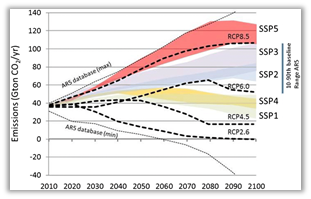IESVic Seminar: Decarbonization Pathways: A biophysical macroeconomic assessment of energy transitions and emissions reductions
Dr. Martin Sers
Thurs., June 16th
1:00-2:00 pm
Hybrid EventIn-person: EOW 230
Online: Zoom (details below)
Rapidly reducing emissions implies rapid and large-scale transformations in energy generation and end use, and commensurate adjustments in the magnitude and sources of investment. Several key questions emerge: First, to what extent can the transition be financed by a redirection of investment away from fossil-fuels and its auxiliary infrastructure toward green investment, and how much additional investment is necessary? Second, what are the growth implications of successful transition pathways? Third, to what extent are such pathways characterized by the necessity for negative emissions technologies? To study these questions, we construct a biophysically-founded stock-flow consistent input-output (SFCIO) model. Key components of the model are: i) sectoral disaggregation at the NAICS 2-digit level, ii) the integration of these components into a stock-flow consistent social accounting matrix, and iii) inclusion of climate damages at the sectoral level impacting capital stocks and productivities. We explore several scenarios based around the trajectory of fossil-fuel infrastructure: i) a fast transition scenario in which new energy generation capacity and electrification displace fossil-fuels infrastructure faster than it would depreciate (stranded assets), ii) a moderate transition scenario which occurs at the approximate rate of fossil-fuel asset depreciation, and iii) a slow transition scenario in which new fossil-fuel investment is required.
Dr. Martin Sers is a Post-Doctoral Fellow at IESVic working at the intersection of energy analysis, macroeconomics, and deep decarbonization. He is keenly interested in new approaches to the study of macroeconomics that considers both the physical and financial system dimensions of economic activity and how these might be studied together. His research interest is in the relatively new approach to macroeconomics called ecological macroeconomics, and specifically in the derivation of stock-flow consistent input-output (SFCIO) models. Martin has a Bachelor’s degree in Mathematics and Economics from Mount Allison University and a Master’s degree in Economics from Carleton University, and a PhD from York University in Ecological Economics. He has previously worked as an applied economist in Cambridge, UK on the large scale model E3ME exploring the environmental and economic impacts of various policy scenarios.



